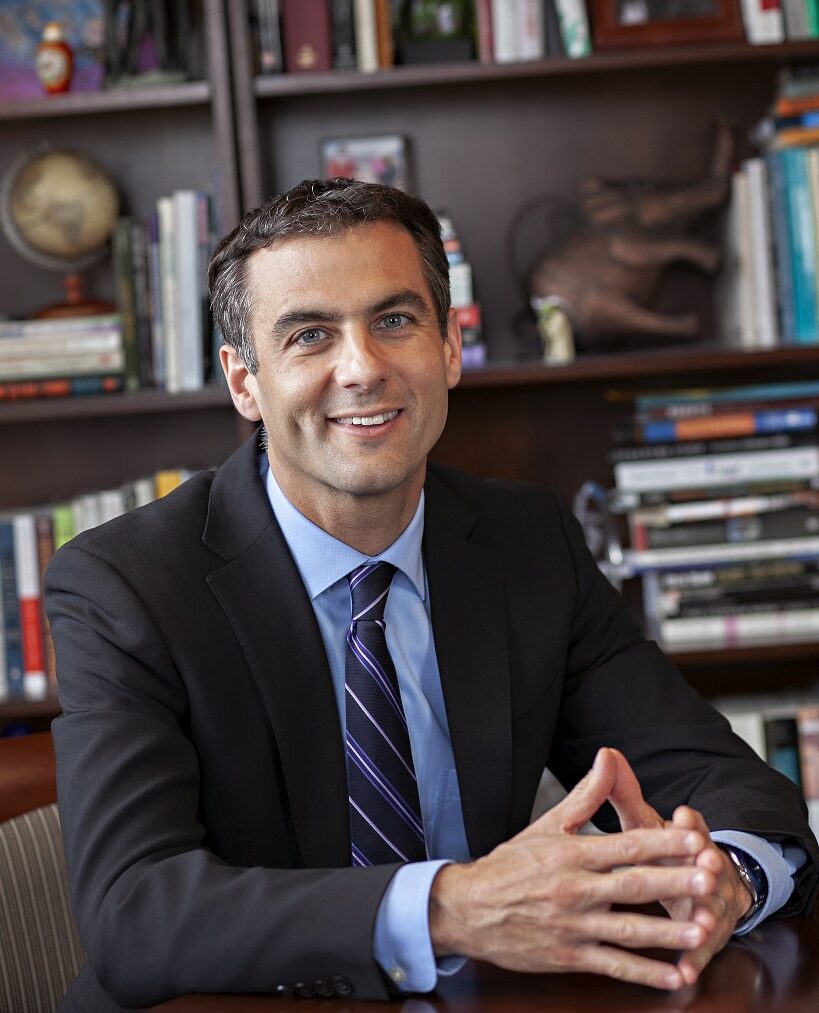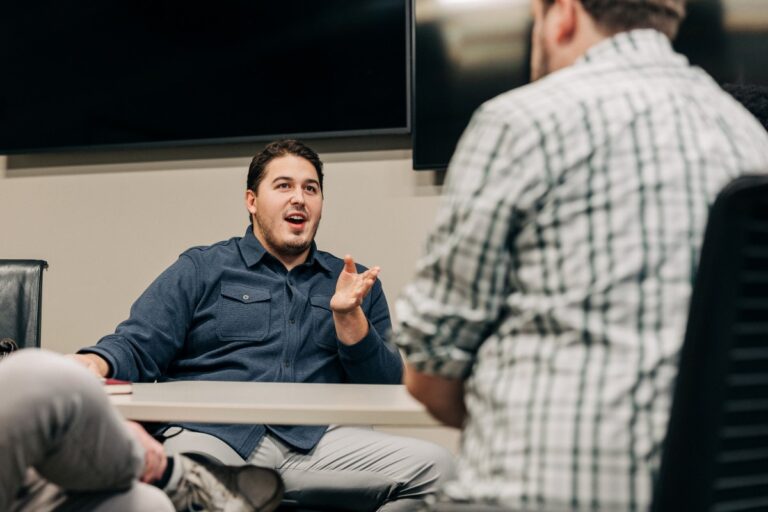At Marvin’s inaugural sales competition, NDSU students sharpen their skills in active listening, product knowledge, and persuasive communication.
Read MoreA College Catalyzed by Philanthropy
The College of Business is a microcosm of the In Our Hands campaign success. Scott Beaulier's hiring as dean aligned with the start of the campaign; benefactors rallied around his vision for what it means to study business at NDSU and began investing.
Story by Nicole Thom-Arens | Illustrations by Leah Ecklund | April 11, 2022

Scott Beaulier, Ronald and Kaye Olson Dean of Business, started at NDSU the same year In Our Hands: The Campaign for North Dakota State University began — 2016. Scott came to NDSU from Arizona State University where he was the executive director of the Center for Economic Liberty. When he started as dean, he was confident he could work to build and improve community partnerships by getting to know people and major executives in the Fargo-Moorhead community and by listening to their needs, concerns, and ideas. By the public launch of the In Our Hands campaign in 2019, the College of Business had built tremendous success within its curriculum and in building relationships with industry leaders and benefactors.
“We framed ourselves as a college that gets things done,” Scott said. “We help our students get here, get through, and graduate, and we do it at a very rapid rate. We have a business-like curriculum; we redesigned everything we were doing in light of feedback from the industry.”
In response to that feedback and in an attempt to meet regional needs, Scott drafted a proposal for a new center at NDSU that would tackle important questions and work to address challenges facing the Midwest, particularly the upper Midwest.
“The key problems in my mind at the time were trade, which was a hot issue politically and remains so. Another one was opportunity. How do we attract more people to the upper Midwest, and how do we unleash their full potential to make this economy as great as it possibly can be? The third pillar was entrepreneurship and innovation and trying to help people get rid of barriers that are getting in the way of them being the best versions of themselves that they can be,” Scott said.
Within just six months of the proposal, the College launched the $30 million Sheila and Robert Challey Institute for Global Innovation and Growth (Challey Institute) in early 2019. A major part of the Challey Institute is gathering faculty from diverse academic backgrounds to tackle issues important to the Institute’s mission in alignment with the student-focused, land-grant, research mission of NDSU.
"Quite honestly, I think philanthropy has saved the College of Business."
Scott Beaulier
Ronald and Kaye Olson Dean of Business
In fall 2020, the Menard Family announced a $5.5 million gift to the Challey Institute. With that gift, the Institute launched the Menard Family Distinguished Speaker Series, which hosts world thought leaders to share their ideas on big questions that explore ways to improve the human condition and create economic opportunity.
“That caliber of speakers is something we’ve not seen at NDSU, and I think it’s something we can point to in the Challey Institute and say before, nothing like this — and after, something really big,” Scott said.
In the three years since its inception, the Institute has funded 39 Challey fellowships. The fellowships help fund faculty research across campus that aligns with the mission of the Institute; the fellowships last a year but are renewable. The Institute also houses 13 Challey Scholars, who are long-term faculty members within the Institute supported by philanthropy.
“What John Bitzan, Menard Family Director of the Challey Institute for Global Innovation and Growth, has done with the fellows program is try to show that we are breaking bread with a lot of campus,” Scott said. “There are partners in every college, and we want to work with anyone who wants to do work overlapping with the Institute.”
In many ways the Institute is still in its infancy. There are faculty to be added to the team, but recruiting someone in the area of trade has been challenging, so the Institute has shifted its direction slightly to focus on Midwestern opportunity. An original inspiration for the Institute, the late Mancur Olson, a 1954 graduate of NDSU who went on to become an economist and intellectual giant, continues to influence the direction of the Institute.
“We’re having success in recruitment in part because there’s an exciting vision, and now we have this mass of people we’ve brought in who are hanging out together and writing together; there’s energy from having a cluster of people, and I think the next few faculty hires will be easier because of the group we already have,” Scott said.
In early 2019, the College of Business launched what is now known as the Center for Entrepreneurship and Family Business (formerly known as the Nice Center), under the direction of Onnolee Nordstrom, the President Jim Ozbun Endowed Chair of Entrepreneurship. While the Center does similar high-powered research like the Challey Institute, it’s mission also involves spreading entrepreneurship education throughout the state.

“They’re trying to reach every high school with entrepreneurship programming, and they’re trying to alert people to our entrepreneurship offerings to make them aware that NDSU is a place you can study entrepreneurship,” Scott said.
Entrepreneurship is a young field and very open in its approaches, which offers a different experience from traditional business classes. While only 2% of people will become entrepreneurs, it’s a field of study from which Scott and his team believe all students can benefit.
“It’s a program that should make students feel uncomfortable and open them to challenges — reinventing and failing and reinventing and failing over and over,” Scott said. “We’ve tried to ingrain that idea in our curriculum because it’s something that we think is important even if you’re not an entrepreneur, but we also want to encourage students to take that leap and consider going from NDSU and into launching something — becoming the next Aldevron, becoming the next Bushel.”
Since the start of the In Our Hands campaign, 26 new scholarships have been added to the College. This additional support for students, according to Scott, has helped maintain enrollment. Scott and his team had noticed an alarming concern within the College: one in four of majors will take a semester off. These new scholarships are helping keep students enrolled for consecutive semesters.

“We want students to go through and maintain knowledge and graduate. I think anytime you take a break, you might not come back,” Scott said. “The scholarships are helping bridge that risk, and we’d like to have more of them to prevent that dropping out scenario. Scholarships are also helping us advance diversity in the College and really focus on social mobility, as well. The Olson/Challey scholarship is an example of really being able to dial in on a disenfranchised group and move the needle there.”
The Olson/Challey First-Generation Business Scholarship is funded by part of Scott’s Ronald and Kaye Olson Deanship and the Challey Institute. It is a one-time award for incoming first-generation students. Both Scott and Ronald are first-generation college students and relate to the unique chal-lenges associated with being first-generation. In 2021, 70 first-generation students were awarded the Olson/Challey scholarship.
“I deeply benefited from higher education myself as a student and really worried about the cost of attendance,” Scott said. “I don’t want students to be taking on really big financial burdens and philanthropy is really helping control that piece for them, as well. It’s an amazing value proposition that we offer at NDSU.”
The philanthropic support from the deanship allows Scott flexibility in determining how funding is distributed within the College, which allows him to pivot to meet critical needs and support initiatives that vary from year to year. The combined philanthropic support to the College throughout the In Our Hands campaign has been transformative. It has allowed for rapid change so that it may better position itself to meet the needs of students, future employers, and the regional economy.
“Quite honestly, I think philanthropy has saved the College of Business,” Scott said. “It’s also injecting this tremendous new energy into the College that’s helping us redefine ourselves.”
Share This Story
Related Stories
The Gift of Possibility
Entrepreneurial NDSU students are getting hands-on experience in the local business ecosystem in a brand-new entrepreneurship fellowship program.
Read More
